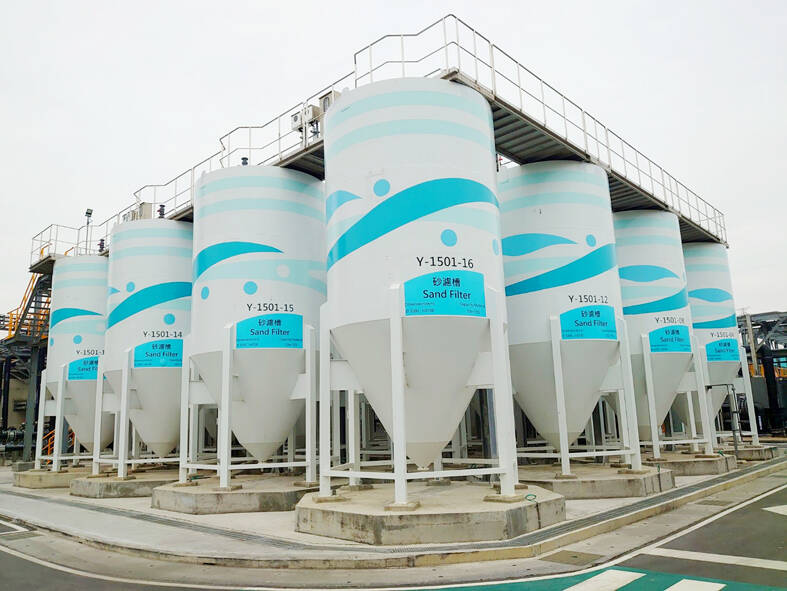Taiwan Semiconductor Manufacturing Co (TSMC, 台積電) yesterday reiterated its plans for comprehensive water treatment and recycling facilities in Arizona, following reports that it could get mired down in “water politics” in the drought-affected US state.
TSMC said in a statement that it plans to construct a water recycling facility to meet the needs of its advanced wafer fabs in Phoenix, adding that it would also build a comprehensive wastewater treatment system to reduce consumption and increase efficiency.
The statement came after the US-based weekly Barron’s on Friday reported that TSMC might need to compete with agricultural users and Native American tribes in Arizona for access to water.

Photo: CNA
The report said Intel Corp’s advanced fabs in Arizona are expected to place additional pressure on TSMC’s water supply.
Citing an estimate from Phoenix officials, the report said TSMC could require up to 40,000 acre-feet (49 million cubic meters) of water a year if it builds six fabs as reported by foreign media, enough to supply 160,000 homes.
TSMC said it has been in contact with Phoenix officials since the initial planning stages of its fabs to ensure that it has sufficient water supplies.
TSMC in December last year said it would expand its investment in Arizona to US$40 billion from the original US$12 billion.
The company is to build a 4-nanometer and a 3-nanometer fab in the state, with the former expected to start mass production next year and the latter in 2026.
TSMC said that, to its knowledge, the authorities in Phoenix are keen to invest in water-related infrastructure to create a sustainable supply.
Phoenix, which can draw on water sources including the Colorado River, the Verde River, the Salt River and underground aquifers, has been designated by the state of Arizona as having a 100-year supply of water, TSMC said.
The company said wastewater released from its facilities would adhere to standards higher than those required by Arizona regulations.

NEW IDENTITY: Known for its software, India has expanded into hardware, with its semiconductor industry growing from US$38bn in 2023 to US$45bn to US$50bn India on Saturday inaugurated its first semiconductor assembly and test facility, a milestone in the government’s push to reduce dependence on foreign chipmakers and stake a claim in a sector dominated by China. Indian Prime Minister Narendra Modi opened US firm Micron Technology Inc’s semiconductor assembly, test and packaging unit in his home state of Gujarat, hailing the “dawn of a new era” for India’s technology ambitions. “When young Indians look back in the future, they will see this decade as the turning point in our tech future,” Modi told the event, which was broadcast on his YouTube channel. The plant would convert

‘SEISMIC SHIFT’: The researcher forecast there would be about 1.1 billion mobile shipments this year, down from 1.26 billion the prior year and erasing years of gains The global smartphone market is expected to contract 12.9 percent this year due to the unprecedented memorychip shortage, marking “a crisis like no other,” researcher International Data Corp (IDC) said. The new forecast, a dramatic revision down from earlier estimates, gives the latest accounting of the ongoing memory crunch that is affecting every corner of the electronics industry. The demand for advanced memory to power artificial intelligence (AI) tasks has drained global supply until well into next year and jeopardizes the business model of many smartphone makers. IDC forecast about 1.1 billion mobile shipments this year, down from 1.26 billion the prior

People stand in a Pokemon store in Tokyo on Thursday. One of the world highest-grossing franchises is celebrated its 30th anniversary yesterday.

Zimbabwe’s ban on raw lithium exports is forcing Chinese miners to rethink their strategy, speeding up plans to process the metal locally instead of shipping it to China’s vast rechargeable battery industry. The country is Africa’s largest lithium producer and has one of the world’s largest reserves, according to the US Geological Survey (USGS). Zimbabwe already banned the export of lithium ore in 2022 and last year announced it would halt exports of lithium concentrates from January next year. However, on Wednesday it imposed the ban with immediate effect, leaving unclear what the lithium mining sector would do in the